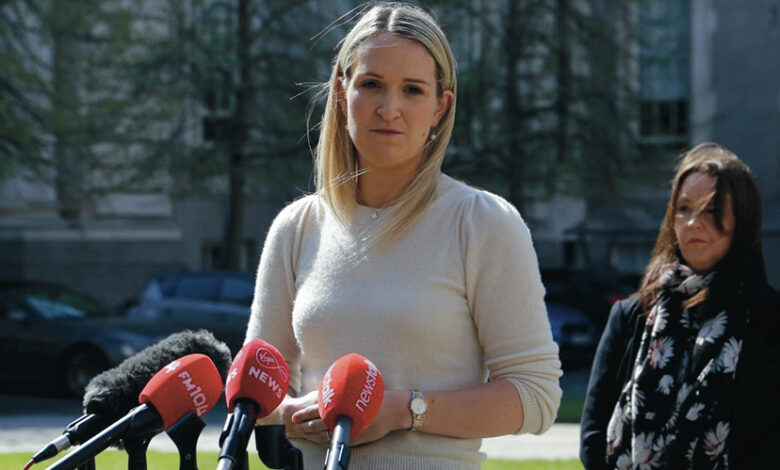Helen McEntee TD: A whole-of-government approach to justice

Minister for Justice Helen McEntee TD discusses her priorities as minister and the Government’s ambition to deliver a justice system for all.
What are your current priorities as Minister for Justice?
My overall aim as Minister for Justice is to ensure there is a fair, safe, and inclusive Ireland. The Justice Plan 2022 outlines my priorities for 2022, a wide –mix of legislative and policy commitments across the civil and criminal briefs of my department. The actions in the Justice Plan will deliver on the Department’s five overarching strategic goals which are to:
– tackle crime, enhance national security, and transform policing;
– improve access to justice and modernise the courts system;
– strengthen community safety, reduce reoffending, support victims, and combat domestic, sexual and gender-based violence;
– deliver a fair immigration system for a digital age; and
– accelerate innovation, digital transformation, and climate action across the justice sector.
Finalising and publishing Zero Tolerance, the Third National Strategy against Domestic, Sexual and Gender Based Violence (DSBGV) was one of my key priorities for me this year and implementing it remains a key focus; I want this strategy to result in a sea change to attitudes around the behaviours that perpetuate and to some extent to date have allowed DSGBV to happen in our society to the extent that it does.
What are the key objectives of the Criminal Justice Sectoral Strategy 2022-2024?
“I believe a collaborative approach is essential in ensuring policy development and decision making is responsive to lived experience and the needs of those most affected. This is not just about collaborating with government departments and services, but about bringing the citizen into the policy making process too.”
Minister for Justice Helen McEntee TD
The Criminal Justice Sectoral Strategy sets out a vision of a joined-up criminal justice system that protects human rights, builds public confidence and trust, and works together to improve efficiency and the experience of those who rely on us to support a safe, fair, and inclusive Ireland.
The implementation the strategy is overseen by the Criminal Justice Strategic Committee (CJSC) which includes senior leaders from all of the major criminal justice bodies, namely the Department of Justice, An Garda Síochána, Irish Prison Service, Courts Service, Probation Service, Director of Public Prosecutions, Legal Aid Board, and Forensic Science Ireland.
The key objectives of the strategy are to prioritise actions to support our shared commitment to prevent and respond to crime and to reduce harm, work to ensure that good quality, timely information is provided to users and that they are dealt with fairness, dignity, and respect at all stages and to build an innovative culture, embedding system-wide thinking, collaborative working and evidence-based decision-making.
How has the Department of Justice sought to enhance collaboration and deliver a more cohesive criminal justice system?
I believe a collaborative approach is essential in ensuring policy development and decision making is responsive to lived experience and the needs of those most affected. This is not just about collaborating with government departments and services, but about bringing the citizen into the policymaking process too – that is why we have run wide ranging public consultations, for example on hate crime, DSGBV and Ireland’s alcohol licencing laws, which have invited submissions not just from sectoral stakeholders but from members of the public too.
“It is a huge honour to serve as Minister for Justice at any time, but particularly so in this, the centenary year of An Garda Síochána. I have been so proud throughout this year to hear the stories and mark the courage and service of our Gardaí, our ‘Guardians of the Peace’, as part of the Decade of Centenaries Programme.”
My department engages in collaborative work with key stakeholders every day and this approach is evident in almost all of our policy and legislative initiatives. For example, when developing the Third National Domestic, Sexual and Gender-Based Violence Strategy we partnered with the National Women’s Council of Ireland and Safe Ireland to ensure it was lived experience-informed. Implementation of the strategy will rely on a whole-of-government approach.
Another example would be the recent publication of the final report of the High Level Taskforce to consider the mental health and addiction challenges of those who come into contact with the criminal justice sector. The recommendations of the taskforce cut across both the Department of Justice and Department of Health and it ensures a multi-agency approach will be taken to rehabilitating and diverting offenders with addiction or mental health challenges away from crime.
Why is the Third National Domestic, Sexual and Gender-Based Violence Strategy 2022-2026 so significant?
The goal and guiding mission of this strategy is clear: zero tolerance in society for domestic, sexual and gender-based violence. Zero tolerance means realising that we have allowed gender-based violence and abuse, and the attitudes and assumptions which underpin it, to result in misery for too many, for too long.
It is important that determination to change is reflected in this strategy. That is why this strategy is not just about a criminal justice approach. It is not only about how we can improve policing or the court system or legislation, although all of those and other areas are addressed and are vitally important.
It is also about involving wider society and all ages, engaging with everyone to change attitudes and to combat this violence and abuse. Zero tolerance is about ensuring a positive impact on the attitudes of men and boys to domestic, sexual and gender-based violence, while also empowering women and girls. I believe this strategy is the firmest demonstration yet of Ireland’s determination to change.
To what extent are the justice sector’s centenary milestones between 2022 and 2024 an opportunity for reflection?
2022 is a particularly significant year for the Department of Justice as it marks centenaries of the establishment of An Garda Síochána, the occupation of the Four Courts and the enactment of the Irish Free State constitution.
It is a huge honour to serve as Minister for Justice at any time, but particularly so in this, the centenary year of An Garda Síochána. I have been so proud throughout this year to hear the stories and mark the courage and service of our Gardaí, our ‘Guardians of the Peace’, as part of the Decade of Centenaries Programme.
This phase of the programme focuses on a period which saw the foundation of the State and the establishment of many of the institutions which have served us since then. This year’s Garda centenary is a cornerstone of the programme across the justice sector over the next three years.
As you have highlighted, these events offer an opportunity to reflect on our history, on those who have lost their lives in service to the nation and its people, and on the immense efforts of those who built the foundations of our new nation.
It also gives us the chance to look back on how we have progressed and the opportunity to look to the future. We have shown that the Justice sector is ready to adapt to the changing landscape.
Implementation of A Policing Service for the Future will see An Garda Síochána transform into a world class policing service with human rights at its core.
We have modernised justice sector services to adjust to the digital age, such as up the digital transformation of our immigration service delivery, the modernisation of the courts system and modernised civil and criminal law.
How do you define the Government’s ambition of delivering a justice system that works for everyone?
Delivering for the public is at the very heart of what we do in the Department of Justice and in Government. The 159 actions outlined in the Justice Plan 2022 are all set with the goal of delivering a justice system that works for all. This is something that I believe we have done through the actions and policies we have taken so far this year.
A key example is the continued implementation of Supporting a Victim’s Journey: A plan to help victims and vulnerable witnesses in sexual violence cases. This important document, which I published in late 2020, acknowledges the fear that many victims of sexual violence have of the criminal justice system and aims to remove that fear, support victims every step of the way and create a system centred around them.
I have published two pieces of legislation this year which work towards making the steps set out in the Plan a reality. In July, I published the General Scheme of the Criminal Justice (Sexual Offences and Human Trafficking) Bill 2022. This important piece of legislation will strengthen the law on consent, provide greater protections and supports to victims of sexual crimes and human trafficking (including putting the National Referral Mechanism on a statutory footing) and ensure anonymity for victims in all sexual offence trials.
In August, I published the Criminal Justice (Miscellaneous Provisions) Bill. This Bill will make it easier for victims to obtain civil restraining orders against stalkers, increase the maximum sentence for assault causing harm from five years to 10 years, make stalking and non-fatal strangulation standalone offences and expand the existing harassment offence.





